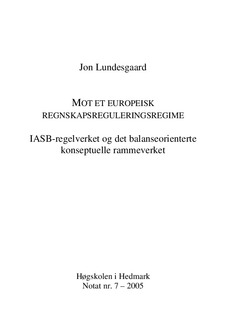Mot et europeisk regnskapsreguleringsregime : IASB-regelverket og det balanseorienterte konseptuelle rammeverket
Working paper
Permanent lenke
http://hdl.handle.net/11250/133472Utgivelsesdato
2005Metadata
Vis full innførselSamlinger
Sammendrag
Norsk: Med tusenårsskiftet fikk vi også et skifte i hvordan en i Europa går videre i møtet med utfordringene på regnskapsreguleringsområdet. I stedet for å satse på en “har-monisering” ved direktiver (som det enkelte land i noen grad står fritt i forhold til) går en over på det som er omtalt som en forordningslinje. Dvs. retningslinjer som har karakteren av lov, og med dette får en i Europa et felles regnskapsreguleringsregime for “større” foretak (først og framst gjelder retningslinjene konsernregnskapene i børsnoterte foretak). Mer konkret innebærer dette at de internasjonale regnskaps-standardene til IASB, og tolkningene av disse, (IASB-regelverket) blir rettslig bindende i en del sammenhenger. Bak IASB-regelverket ligger det et balanse-orientert konseptuelt rammeverk. I notatet blir det gitt en oversikt over og en kritisk vurdering av ideen om et balanseorientert konseptuelt rammeverk. English: In Europe, around passing into a new millennium, there has been an important shift as to how the complex task of accounting regulation is attacked. Instead of a “harmo-nisation” via directives (which are not formally binding in member states), a strategy of direct regulation is pursued, i.e. a sort of regulation having the character of bind-ing law. An implication of this is the establishment of a European accounting regu-lation regime for “bigger companies” (first of all with effect for companies issuing securities traded in financial markets). More specifically, this is done by making the international accounting standards of IASB (including official interpretations), bin-ding. As a sort of foundation for the accounting standards, a balance oriented concep-tual framework is established. In this note, the idea of this sort of framework is out-lined. This includes some elements of the professional discussion on the issue.
Serie
Notat07/2005
